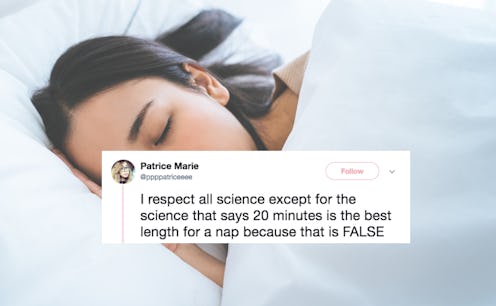Life
Twitter Is Hilariously Divided Over How Long A Nap Should Be — But Here’s What Studies Say
When it comes to naps, there's all sorts of conflicting information available about exactly how long the perfect nap should be. There's the 26-minute NASA nap, the "Dalí nap," a micronapping method developed by painter Salvador Dalí that lasted no longer than it took for him to doze off and drop the key he was holding, and of course, there's the "naps" all of us take sometimes, where what's intended to be an hour lie-down turns into waking up way later and going, "Eh, may as well go to bed." But though the denizens of Twitter can't seem to agree on how long naps should be, science has thankfully provided us with some nap knowledge.
According to Twitter, naps are between one and a half and two hours. But also 27 minutes. And two to six hours. But at least in poll form, there was a clear winner: Twitter user @miranda_sorrow ran a poll that, as of post time, had 67,459, with 49 percent of voters saying a nap is between one and two hours.
Despite the divergence in people's opinions of ideal nap lengths, not many seem to be disagreeing with the assertion that naps are great. According to the American Psychological Association, naps can improve reaction time, logical reasoning and symbol recognition, and there's evidence to show that if you sleep after learning something, your brain has time to process the new information and you'll actually do better on a task than you would "immediately after learning it," Dr. Sara Mednick told the American Psychological Association.
Mednick and her team also found that if folks were asked to take a test, they did just as well on a 60- to 90-minute nap as they did after a whole night of sleep, the American Psychological Association reported.
But does that mean a 60- to 90-minute nap is ideal? There are certainly other scientific opinions. The aforementioned "NASA nap" is the result of a 1995 NASA study that showed "a 26-minute nap improved performance 34% and alertness 54% [sic]," according to TIME.
For someone like me who has generalized anxiety, though, the idea of lying down to take a precisely 26-minute nap is so stressful (what if I sleep for 30 minutes? How do I set an alarm so I give myself enough time to fall asleep and get the full 26 minutes?) I can never actually take them. However, that might not be such a bad thing, according to some other studies. Science of People collected data and came to the conclusion that naps that are 90 minutes long generally allow you to reach your full cycle and drop into rapid eye movement (REM) sleep.
According to Science of People, if you nap for 90 minutes, you can help yourself dodge sleep inertia, which is comprised of the "minor effects of grogginess" than can result from short-term naps. "A [90-minute nap] helps you avoid sleep inertia and makes it much easier for you to wake up," Science of People's lead investigator Vanessa Van Edwards wrote.
Van Edwards also wrote that along with keeping that 90-minute mark in mind, you should also nap between 1 p.m. and 4 p.m. "Napping later than that could interfere with your night schedule," she wrote.
Forbes also reported that the 90-minute nap is ideal, and outright indicated that we should all avoid 30-minute naps, citing sleep inertia. Thirty-minute naps can be detrimental because "the body is forced awake right after beginning, but not completing, the deeper stages of sleep." You can take shorter or longer naps, Forbes added, but 30 minutes seems to be whatever the terrible equivalent of a magic number is.
So, though Twitter is still undecided, science seems to have spoken, and the 90-minute nap is king.
